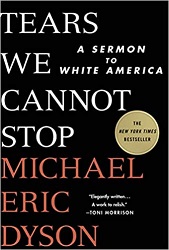
 Tears We Cannot Stop
Tears We Cannot StopA Sermon to White America
Review posted April 23, 2020.
St. Martin’s Press, 2017. 228 pages.
Review written August 17, 2019, from a library book
Starred Review
First, thanks to the Racial Reconciliation Group at Floris United Methodist Church for recommending this book. I did not make it to the meeting where the book was discussed, but I did read it in time for the meeting. And I was deeply challenged to look at the world differently.
This isn’t a comfortable book for a white person to read. But I was challenged that my very comfort is something I take for granted because I’m white. I’ll let the author explain the book from his “Call to Worship”:
America is in trouble, and a lot of that trouble – perhaps most of it – has to do with race. Everywhere we turn, there is discord and division, death and destruction. When we survey the land, we see a country full of suffering that we cannot fully understand, and a history that we can no longer deny. Slavery casts a long shadow across our lives. The spoils we reaped from forcing people to work without wages and treating them with grievous inhumanity continue to haunt us in a racial gulf that seems impossible to overcome. Black and white people don’t merely have different experiences; we seem to occupy different universes, with worldviews that are fatally opposed to one another. The merchants of racial despair easily peddle their wares in a marketplace riddled by white panic and fear. Black despair piles up with each body that gets snuffed on video and streamed on social media. We have, in the span of a few years, elected the nation’s first black president and placed in the Oval Office the scariest racial demagogue in a generation. The two may not be unrelated. The remarkable progress we seemed to make with the former has brought out the peril of the latter….
If you’re interested in my social analysis and my scholarly reflections on race, I’ve written plenty of other books for you to read. I tried to make this book one of them, but in the end, I couldn’t. I kept coming up short. I kept deleting words from the screen, a lot of them, enough of them to drive me to despair that I’d ever finish. I was stopped cold. I was trying to make the message fit the form, when it was the form itself that was the problem.
What I need to say can only be said as a sermon. I have no shame in that confession, because confession, and repentance, and redemption play a huge role in how we can make it through the long night of despair to the bright day of hope. Sermons are tough, not only to deliver, but, just as often, to hear. Yet, in my experience, if we stick with the sermon – through its pitiless recall of our sin, its relentless indictment of our flaws – we can make it to the uplifting expressions and redeeming practices that make our faith flow from the pulpit to the public, from darkness to light.
This book is challenging. It’s also eye-opening. I don’t know if I’ve ever listened to someone speak so frankly about what it means to be black in America. Stories are told, history is detailed, statistics are listed. These are all things I’d rather not think about. I’d like to think America has grown past racism, but of course even I can’t think that given the behavior of our current president. So it’s time for me to listen to voices that aren’t white.
This book is a very good start.
The “Benediction” section does have some suggestions for action. One of those is cultivating empathy.
Beloved, all of what I have said should lead you to empathy. It sounds simple, but its benefits are profound. Whiteness must shed its posture of competence, its will to omniscience, its belief in its goodness and purity, and then walk a mile or two in the boots of blackness. The siege of hate will not end until white folk imagine themselves as black folk – vulnerable despite our virtues. If enough of you, one by one, exercises your civic imagination, and puts yourself in the shoes of your black brothers and sisters, you might develop a democratic impatience for injustice, for the cruel disregard of black life, for the careless indifference to our plight.
Empathy must be cultivated. The practice of empathy means taking a moment to imagine how you might behave if you were in our positions. Do not tell us how we should act if we were you; imagine how you would act if you were us. Imagine living in a society where your white skin marks you for disgust, hate, and fear. Imagine that for many moments. Only when you see black folk as we are, and imagine yourselves as we have to live our lives, only then will the suffering stop, the hurt cease, the pain go away.
